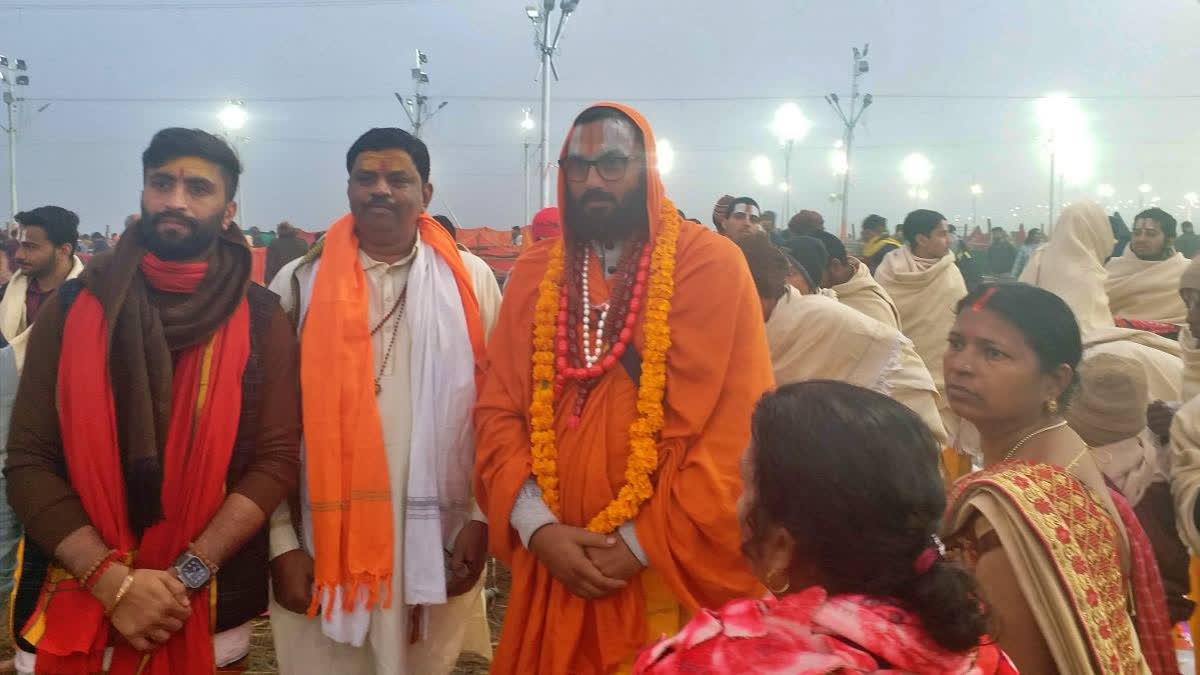Prayagraj: Acharya Rupesh Kumar Jha, along with 25 children from his Gurukul, participated in the Maha Kumbh at the banks of the Sangam. The group hails from Mithilaanchal, specifically from Lakshmipati Gurukul in Bihar's Madhubani district.
Acharya Rupesh, an advocate for Sanatan Dharma, spoke to ETV Bharat about his journey and his mission. He shared that despite having qualified for the UGC NET exam seven times and JRF twice and having left three government jobs, he chose to dedicate his life to the upliftment of Hinduism through the ancient Gurukul education system.
He explained, "To be born as a human in the Sanatan Hindu religion and to sit on the banks of the Ganga to worship after acquiring Sanskrit knowledge is indeed a great fortune."
Acharya emphasised the rarity of the occasion for the children accompanying him. "We have around 125 children at the Gurukul, but only these 25 could join us on this spiritual journey. It is a great privilege for them, and for me, to divine experience together," he added.
Acarya Rupesh also revealed his goal of opening 108 Gurukuls across Bihar in his lifeline, with a primary focus on the Mithila region. His vision extends beyond education. He believes in the strength of unity in preserving Sanatan values and tradition. "This is a time for all Sanatani Mahatma to unite. The message of the Maha Kumbh is about unity and faith," he said.
Among the group of disciples, one young boy, Ayush Kumar Jha, stood out. Though still new to the Gurukul system, Ayush already impressed onlookers with his knowledge of Sanskrit sholkas, particularly the Mahamrityunjaya mantra, which he recited with clarity and devotion. "I feel blessed after taking the bath in the Sangam. I am excited to start my education in the Gurukul," Ayush shared.
Gaurav Kumar Mishra, a Prag Shastri second-year student from the Gurukul, was also present at the event. He expressed his concerns about the current state of Sanatan Dharma. "People are leaving Sanatan Dharma and it is a cause for concern. But we are determined to uplift it and spread the teachings of our religion," Gaurav said.
Amol Kumar Jha, a first-year disciple in the Gurukul system, spoke about the importance of balancing tradition with modernity. "We cannot be confined only to Sanskrit or ancient history. We need to embrace modernity as well to move forward. But we will always prioritise the awakening of Sanatan Dharma."
Shashi Shekhar, another disciple who recently left English-medium schooling to join the Gurukul, emphasised the significance of Sanskrit. "Sanskrit is the language of the Gods. Lord Shri Ram himself progressed through the Gurukul system, and that this why we are following the same path," he said.



